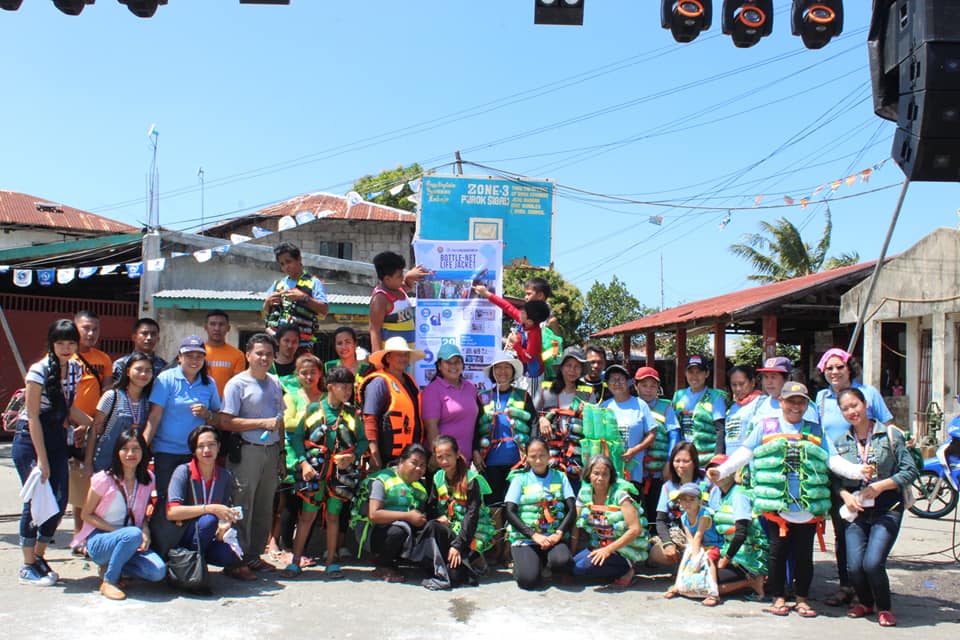Bottlenet lifejackets are low-cost flotation devices made from recycled fishing nets and plastic waste. With 60 per cent of the 106 million Filipino population vulnerable to drowning every typhoon season or during torrential rains, this innovation provides a vital life-saving solution with pockets for bottled water as well as bottles filled with plastic waste to enable buoyancy. It also creates jobs for unemployed women and addresses the growing problem of plastic waste in seas and river systems.
A coastal environment in trouble, increasingly prone to flooding and littered with plastic debris. A community with limited resources to protect themselves in times of disaster. Not a healthy combination. Yet, within this sorry scenario, a group of innovators from the Carlos Hilado Memorial State College in the Philippines saw an opportunity: affordable personal flotation devices.
“Commercially available devices typically run upwards of 2,000 pesos or roughly US$40, which for an average family whose breadwinner makes 500 pesos a day for living expenses, makes them a pricey purchase solely for emergencies,” say the innovators.
Their Bottle-Net Life Jacket is a DIY personal flotation device made from recycled fishing net sewn into the shape of a traditional vest, lined with several pockets. The upper part of the jacket can hold one or two 500ml bottles of drinking water, prolonging the possibility of survival by days. Into the rest of the pockets go recycled 500ml plastic bottles, which by themselves are enough to keep the jacket buoyant, but are lined with Styrofoam and plastic waste, which can absorb any impact from collision or debris.
According to the Global Facility for Disaster Reduction and Recovery, the Philippines is at high risk from cyclones, earthquakes, floods, landslides, tsunamis, volcanic eruptions, and wildfires. Since 1990, the Philippines has been affected by 565 natural disasters that have claimed the lives of nearly 70,000 Filipinos and caused an estimated US$23 billion in damages. At least 60 per cent of the country’s total land area is exposed to multiple hazards, and 74 per cent of the population is vulnerable to their impact.
The team from Carlos Hilado Memorial State College have developed prototypes, expertly sewn by a local Women’s Association. Their implementation plan is to produce sufficient jackets for 350 families in the city of Talisay and over the next two years, 1,700 more for the flood-prone areas in the province of Negros Occidental and its adjacent regions. A social business enterprise, the project is providing work for unemployed women.
“There is no campaign for disaster preparation using a flotation device in the country. With 60 per cent of the 106 million Filipinos living along coastal and river system areas, a large portion of the population is vulnerable to drowning every typhoon season or during torrential rains,” the innovators explain.
They are seeking investment for the production and marketing of the vests as well as mentoring to further increase and improve the promotion and production of the flotation device within the Philippines. They plan to sell the life jacket at PhP 650.00 per piece which will be reinvested to provide initial funding and sustain the project.
The vest is a much-needed safety device, but it also offers income generation, a livelihood for women and a solution to solid waste management. The Philippine Coast Guard has commended the innovation as comparable to the premium life jacket they are using.
More Detail on The Innovation
Problem: The need for affordable, life-saving personal flotation devices in flood-prone areas of the Philippines, where 60 per cent of the population live. A coastline being destroyed by non-biodegradable waste, particularly plastics. Solution: A flotation device made from recycled fishing net, lined with several pockets. The upper part of the jacket holds 500ml bottles of drinking water, while the rest of the pockets contain recycled 500ml plastic bottles for buoyancy. These are lined with Styrofoam and plastic waste, to absorb impact from collision or debris.
Current status: Year One: Prototypes have been produced by a local women’s group, engaging 23 women. Testing has been conducted at sea, involving local fishermen and women and residents.
The project has been supported by Tuklas Innovation Labs
Proposition: The innovators are seeking support to scale up the project. They are seeking GBP 32,840.72 over three years to continue production, for customer education and demand generation, a women’s skills training programme, the procurement of equipment, and to the establish a distribution network and branding.
Their intention is to sell 200 pcs of the Bottle-Net Life Jacket at PhP 650.00 per piece to reinvest in the initial fund and sustain the project.
Founders: Carlos Hilado Memorial State College
Endorsements: Philippine Coast Guard, the Provincial and City Disaster Risk Reduction & Management Office and Philippine Life Saving were involved in the testing, feedback and improvements of the Bottle-Net Life Jacket. The Philippine Coast Guard said the innovation is equally comparable to the premium life jacket they are using.
Formal certification from the relevant authority is still required.
Contact: +639258743209 or +639676627073
Read more about other innovations from the DEPP Innovation Labs.

